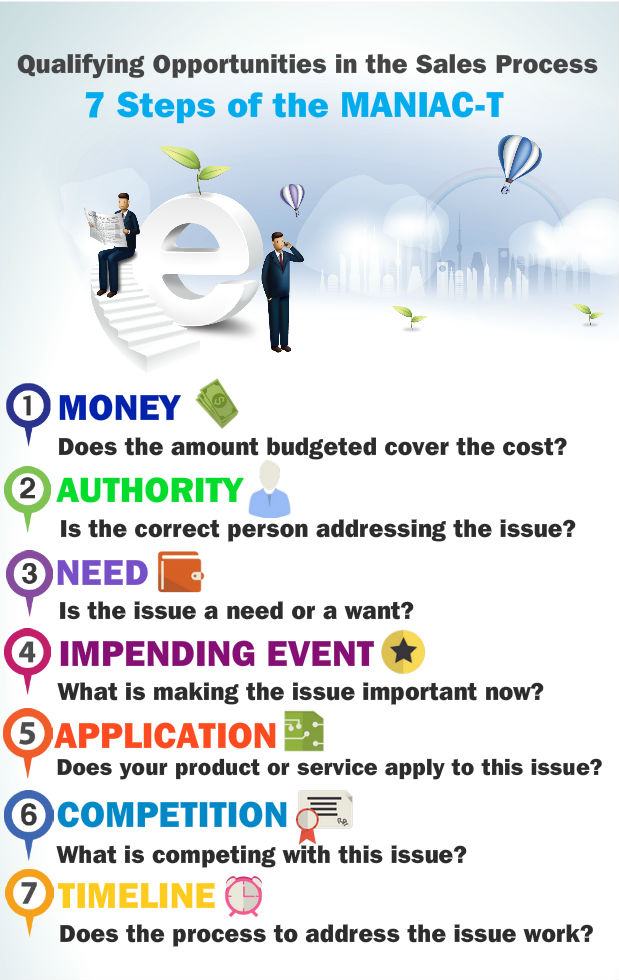In order to grow, businesses need to build, nurture and maintain a healthy pipeline of opportunities with clients and prospective clients for their products or services. However, many people create unnecessary stress throughout the process believing that the only reason anyone chooses their product or services is because they like them when, in fact, the need for the product or service was what initiated the opportunity.

How Qualifying Opportunities in the Sales Process Can Cause Stress
Think about the last time you watched someone struggle through a speech or presentation. Did you feel really bad for them, and want them to get through the rest of it quickly so the embarrassment would end? If your answer is yes, this is because we are emotional human beings with a natural desire to help one another. So why is it that when money is involved, so many people feel as though the other person might take advantage of them. Well, it’s pretty simple… these people are seeing ‘themselves’ as the opportunity is overlooking the true need for the product or service.
Consider your last major purchase and the process you went through to buy whatever you bought. You likely worked with a salesperson or someone with a similar title. What’s interesting is that you may have never known this person before getting interested in their product or service. Why is this important? Because it is not ‘them’ that you needing when you start the process. You set out looking for the product or service you either needed or wanted first.
You see, when we are buying or selling something, we actually need the ‘result’. In order to feel confident with the company we are considering to deliver on this result, we must know, like and trust the person we are working with, yet it is important to remember that it is the result we are after. The challenge is the language and perception we create when we say we are qualifying prospective clients when we are also qualifying opportunities to provide the product or service the client or prospective client needs or wants.
Qualifying opportunities in and out of your pipeline is a good thing. In fact, it is the best way of serving the client and prospective client. If you do not have the best product or service for the client’s wants or needs, you should be referring them to another business that does. For instance, let’s say an Author or Expert in a certain field wants to promote their products and services on the Internet and calls a marketing firm for help. If the marketing firm is more of an advertising agency for businesses and less suited to market an Author or Expert, its doing them a disservice if the ad agency doesn’t refer them to an Internet marketing authority for this type of need. Not only does this help the prospective client find the best Internet marketing company for their specific need, but it’s also likely they’ll remember the marketing firm who referred them if they ever hear of a traditional business needing help.
How to Help Qualify Opportunities in the Sales Process
Too often, sales organizations make the qualification process one that strictly attempts to qualify themselves OR the prospective client only without qualifying the opportunity. In order to avoid making the qualification process stressful where each party is trying to avoid insulting or getting taken advantage of by the other, here is a 7 Step Process for Qualifying Opportunities we’ve learned and used to help us help our clients and others.
- Money – Does the amount budgeted cover the cost?
If you are considering remodeling your kitchen and have saved $25,000 to do so, this is important. Consider the fact that a remodeling contractor comes to visit with you and takes 2 hours of your time understanding what you want and much more of their time driving, visiting with you, putting together the costs of the kitchen remodel project and various other tasks only to find that the cost will be $75,000. Wouldn’t you believe your time and theirs had been wasted? Imagine you’re the remodeling contractor and you do not ask for the budget. Now you’ve proposed something unrealistic and you never meant to insult or waste the prospective clients time. If the prospective client will not share the budget, at least get a range so that you do not waste their time or yours. - Authority – Is the issue being explained and addressed by the correct person?
In the above analogy for home remodeling, if you’re working with someone who rents the home and the owner is actually responsible for the cost, don’t you think it is important to visit with the owner. This isn’t because you do not respect the renter, its actually because you DO. You see, if you put the above recommendation in the hands of the renter and she takes it to the homeowner who already has someone else who is proposing a far different solution at a much less cost, you are jeopardizing the relationship between the homeowner and renter. Now the homeowner thinks the renter is trying to take advantage when the reality is the opportunity each was considering was really the only difference. - Need – Is this a true need or merely a want?
When qualifying opportunities in the sales process, if the client sees it as a want, be careful. Ask anyone if they want a new car for free and they will usually say ‘sure’. Since we know nothing is free (even the cars won at golf tournaments come with tax implications for the winners), the real need should be identified and well understood by all parties. - Impending Event – What is making the issue important now?
If your home is flooded and you’re looking for a water damage company to restore it, this is easy to understand. However, if you’ve owned the home for 10 years and wanted a custom pool ever since you moved in, why now? It may be that you have a bonus coming in December and you would like the pool built for your family to enjoy by July. This is important to understand… especially if July is not realistic. Someone needs to share this with you and determine what is. If you’re the custom pool builder being considered, you should be explaining this to help the homeowner. - Application – Does your product or service apply to this issue?
If you are selling screwdrivers and a hammer is what is needed, don’t try to sell a hammer. Same goes if you are the buyer… square pegs do not fit in round holes for a reason. Make sure the product or service was designed to help with this type of issue. - Competition – What is competing with this issue?
While many people believe this is only ‘who’ the prospective client is considering, its actually more than that. When qualifying opportunities in the sales process, it’s also what else is standing in front of helping both parties address the issue together. Sometimes it might be the consideration for additional proposals is the prospective client has no earthly idea what it should cost, yet other times is other competing issues. Often it is something else competing for the investment. For instance, if someone is looking to remodel their home but they’re funds are going to the swimming pool they built two years ago, the competition is really more about the length of time it takes to get the pool paid for so funds can go towards the remodel. - Timeline – Does the process to address the issue work?
Often times the opportunity needs to be addressed within a timeline that might not be understood until everyone is ready to start the process. Then the buyer is told it is 8 week and expected two, so he or she is upset, yet they may not realize that it is absolutely humanly impossible for the opportunity to be addressed within anything less than 6 weeks. It’s not that anyone is trying to rain on their parade, but it turns out to be the case.
Qualifying opportunities in the sales process changes when all parties understand these, so keep this in mind with your next purchase or sale and be open to sharing with the other party to make this process simpler. For help with your business marketing and sales needs, call Social180 at 469-420-0180.




